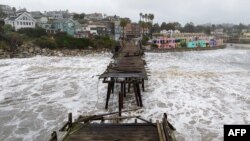U.S. President Joe Biden repeated his warnings about climate change on Thursday during a visit to California as he toured the damage caused by recent storms.
The president promised more federal help and touted his plan to mitigate the effects of extreme weather, which Biden said are caused by climate change.
“We have to invest in stronger infrastructure to lessen the impact of these disasters because they become cumulative, in a sense,” he said. “We've already allocated funding from the infrastructure law that I signed a year ago.”
His top emergency official delivered a sobering assessment of the situation as Biden flew across the nation to witness the damage firsthand with California Governor Gavin Newsom.
“California has really experienced some unprecedented storms — nine atmospheric rivers that have gone through since right before the new year,” said Deanne Criswell, who heads the Federal Emergency Management Agency. “When I talk to people on the ground, what they told me is that, you know, these storms are coming with hurricane-strength winds, and they're also making incredible storm surge-like conditions with the surf. And so, they felt like it was being hit by hurricane after hurricane.”
Biden said he’s made strides toward managing the effects of climate change through the recently passed Inflation Reduction Act, which sends nearly $400 billion in federal funding to clean energy — a move aimed at meeting the U.S. commitment under the Paris Agreement, which aims to limit global warming to less than 2 degrees Celsius.
And he’s promoted U.S. innovation in clean energy through electric vehicles and more.
'We're not prepared'
Sherri Goodman, who served as the first deputy undersecretary of defense for environmental security during the Clinton administration, told Voice of America that the U.S. government has long seen climate change as a threat.
“We have to understand it in terms of these compound and cascading risks, because one risk — wildfire-fueled storms — then has an impact on the next set of climate events, these extreme events, these atmospheric events. They all interact,” she said via Zoom. “So, that is very important. And we're not prepared, unfortunately, as societies around the world.”
The burden, Goodman said, should be shared by the government and the private sector — a message also being heard by global power players at the World Economic Forum. Biden sent his top climate envoy to this week’s meeting in Davos, Switzerland.
Goodman said change will take time.
“We can't just go cold turkey on fossil fuels,” she said. “We're going to be using oil and gas for some time still.”
Critics push for declaration of emergency
But Biden’s critics say leaders should be more aggressive, especially when it comes to confronting polluting industries.
“We cannot fix this problem without strong government action,” said Kassie Siegel, who leads the Center for Biological Diversity's Climate Law Institute. She spoke to VOA via Zoom. “And that needs to start by confronting the fossil fuel companies that are at the heart of the problem and have sought to distract, deny and delay for so long.”
Siegel and other environmental campaigners are urging Biden to declare a climate emergency.
“How many more lives must be lost?” asked Caroline Henderson, Greenpeace USA senior climate campaigner. “How many more decimated homes must President Biden and Governor Newsom visit? … Last year, President Biden said that he would deal with the climate emergency, but we have seen very little action. It’s time for him to make good on those words by declaring a climate emergency.”
Some of Biden’s political opponents, even fellow Democrats like Senator Joe Manchin, have blunted more sweeping legislation, arguing that those industries create valuable jobs.
